“Don’t Let Perfect be the Enemy of Good” – Start with an Imperfect Draft, Get a Reading Partner, and Use Writing Tools
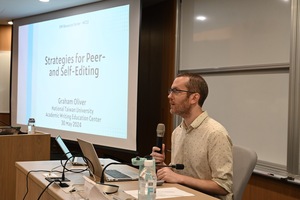
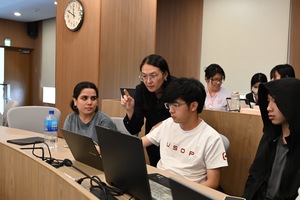
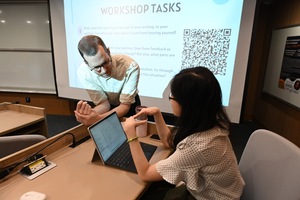
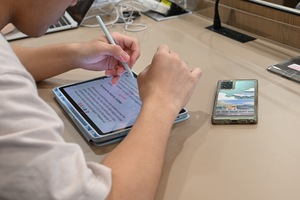

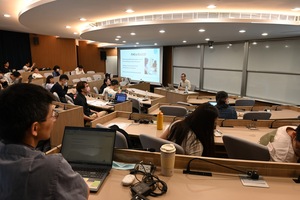
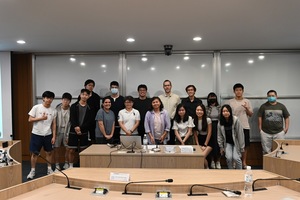
Date :
2024-06-04
Department :
EMI Resource Center
【Article by EMI Resource Center】
On May 30, 2024 (Thursday), the EMI Resource Center held a writing workshop titled “Strategies for Peer- and Self-Editing, In and Out of the Classroom” at the Dah Hsian Lecture Hall in the Dah Hsian Library on the NCCU Zhihnan Campus. This was the second workshop, following the first one titled "Strengths, Weaknesses, and Confusion: AI-Assisted Writing in the Classroom," which introduced the fundamental knowledge required for applying LLMs in writing and classroom teaching: https://www.nccu.edu.tw/p/406-1000-16636,r131.php?Lang=zh-tw. This workshop was also led by Mr. Graham Oliver, a senior lecturer with over ten years of teaching experience, and aimed to enhance academic writing and editing skills. It attracted faculty and students from various departments, with 40 participants attending in person and 15 joining online.
The event began with an introduction to the workshop by Professor Siaw-Fong Chung, the center's director. Mr. Graham Oliver, currently a lecturer at the Academic Writing Education Center of National Taiwan University, shared, “Editing is the favorite part of my job – working with a writer to take something they’ve created and help them figure out how to make it better.” The workshop provided detailed explanations and practical exercises on effective writing and editing methods. Mr. Graham Oliver compared writing to building a house, with structure and foundation needing to be layered like a sculptural process. He emphasized that writing involves repeated revisions, as initial drafts are often full of errors and structural issues. Editing aims to remove unnecessary parts, add essential details, and clarify the content. Mr. Graham Oliver recommended enhancing editing skills through extensive reading and writing, stating, “Becoming a good editor can help you become a better writer.” He also stressed the importance of feedback, advising participants to consider different readers' perspectives and to selectively accept feedback to improve writing quality and broaden their thinking.
Discussing how to lower the barrier to writing, Mr. Graham Oliver referenced Anne Lamott's famous essay “Shitty First Drafts,” encouraging participants to accept the imperfections of initial drafts. He suggested that acknowledging that the first draft may be rough helps reduce self-editing pressure and encourages early completion to allow ample time for revision. Mr. Graham Oliver also emphasized the importance of finding a reliable reading partner as a crucial step for professional or academic writers. He suggested seeking feedback from colleagues, family members, friends, or writing center tutors. Modern tools like large language models (LLMs) and search engines can also play a significant role in the editing process. Mr. Graham Oliver discussed the pros and cons of these tools, advising their reasonable use. LLMs can provide immediate feedback, though their suggestions may only sometimes be accurate. Search engines like Google can help verify common usage of phrases, improving writing precision.
In writing, self-editing is often one of the greatest challenges for authors. Immersed in their work, they may struggle to identify issues in their writing. To address this common problem, Mr. Graham Oliver introduced various ‘defamiliarization’ techniques to help writers view their work from a fresh perspective and effectively spot potential issues. ‘Spaced Reading’: Set the document to triple line spacing to slow down reading and examine each paragraph more closely. ‘Reverse Reading’: Read the article backward, starting from the last sentence, to break habitual thinking patterns. ‘Font Change’: Simply changing the font can help authors notice overlooked errors with a new perspective. ‘Print vs. Screen Comparison’: Edit on a printed version or view the article on different electronic devices to review the work with different tools. Mr. Graham Oliver emphasized that these methods assist writers in overcoming habitual thinking patterns, especially when it comes to recognizing problems with wordiness or sentence construction.
Mr. Graham Oliver highly recommended reading aloud as a self-editing method. By doing so, writers can more easily spot long sentences and awkward phrasing. Having someone else or a computer read the text also provides different auditory feedback. He advised participants to customize their editing strategies based on personal needs. Mr. Graham Oliver emphasized that being a good editor requires considering the overall coherence of the article, not just grammatical errors. He stressed the importance of providing constructive feedback, explaining issues, and suggesting improvements to help authors better understand and enhance their writing. During the workshop, participants first read and reflected on the opening paragraphs of their texts, then exchange drafts with a partner to provide feedback. They not only pointed out areas for improvement but also highlighted the strengths of the articles. This interaction not only enhanced communication among participants but also taught them more practical editing techniques.
The workshop provided valuable advice for teachers on effective peer review. Teachers should demonstrate by having the whole class mark a sample article and answer questions during the feedback process to enhance students' editing skills and interest in writing. Writing is a continuous improvement process, so it is important to emphasize the value of revisions. Encourage students to submit multiple drafts to enhance the quality of their work, build confidence, and foster enthusiasm.
Mr. Graham Oliver recommended the following strategies for evaluating student work: separate feedback from grades to focus on improvement rather than scores; highlight significant and recurring errors; tailor feedback to writing goals while grading based on the final submission to clarify future improvement areas. He advised that while marking grammar and formatting errors is easy, teachers should ensure students understand how to improve, offering further guidance. Mr. Graham Oliver emphasized the importance of a growth mindset, highlighting that writing is an ongoing process. He suggested requiring drafts and rewrites, making final articles revised versions of previous ones, and pointing out strengths and areas for further improvement.
At the end of the workshop, Yen Yu-Che, a writing consultant at the EMI Resource Center and a Ph.D. student, introduced the participants to the application of the writing software Writefull. Writefull offers many features, such as real-time grammar and spell checks while writing, helping to correct errors immediately. It also allows users to query large corpora to ensure proper word usage and standards. The detailed introduction aimed to help students and teachers better understand and use this tool.
The center is very grateful to Mr. Graham Oliver for his excellent presentation, which gave teachers and students a deeper understanding and application of effective self and peer-writing editing. The center also offers comprehensive writing consultation services and welcomes students to make appointments. We provide personalized advice and guidance based on individual writing issues. Additionally, we offer guidance on using Writefull. Please visit the EMI Resource Center's website and Facebook page for more information.
On May 30, 2024 (Thursday), the EMI Resource Center held a writing workshop titled “Strategies for Peer- and Self-Editing, In and Out of the Classroom” at the Dah Hsian Lecture Hall in the Dah Hsian Library on the NCCU Zhihnan Campus. This was the second workshop, following the first one titled "Strengths, Weaknesses, and Confusion: AI-Assisted Writing in the Classroom," which introduced the fundamental knowledge required for applying LLMs in writing and classroom teaching: https://www.nccu.edu.tw/p/406-1000-16636,r131.php?Lang=zh-tw. This workshop was also led by Mr. Graham Oliver, a senior lecturer with over ten years of teaching experience, and aimed to enhance academic writing and editing skills. It attracted faculty and students from various departments, with 40 participants attending in person and 15 joining online.
The event began with an introduction to the workshop by Professor Siaw-Fong Chung, the center's director. Mr. Graham Oliver, currently a lecturer at the Academic Writing Education Center of National Taiwan University, shared, “Editing is the favorite part of my job – working with a writer to take something they’ve created and help them figure out how to make it better.” The workshop provided detailed explanations and practical exercises on effective writing and editing methods. Mr. Graham Oliver compared writing to building a house, with structure and foundation needing to be layered like a sculptural process. He emphasized that writing involves repeated revisions, as initial drafts are often full of errors and structural issues. Editing aims to remove unnecessary parts, add essential details, and clarify the content. Mr. Graham Oliver recommended enhancing editing skills through extensive reading and writing, stating, “Becoming a good editor can help you become a better writer.” He also stressed the importance of feedback, advising participants to consider different readers' perspectives and to selectively accept feedback to improve writing quality and broaden their thinking.
Discussing how to lower the barrier to writing, Mr. Graham Oliver referenced Anne Lamott's famous essay “Shitty First Drafts,” encouraging participants to accept the imperfections of initial drafts. He suggested that acknowledging that the first draft may be rough helps reduce self-editing pressure and encourages early completion to allow ample time for revision. Mr. Graham Oliver also emphasized the importance of finding a reliable reading partner as a crucial step for professional or academic writers. He suggested seeking feedback from colleagues, family members, friends, or writing center tutors. Modern tools like large language models (LLMs) and search engines can also play a significant role in the editing process. Mr. Graham Oliver discussed the pros and cons of these tools, advising their reasonable use. LLMs can provide immediate feedback, though their suggestions may only sometimes be accurate. Search engines like Google can help verify common usage of phrases, improving writing precision.
In writing, self-editing is often one of the greatest challenges for authors. Immersed in their work, they may struggle to identify issues in their writing. To address this common problem, Mr. Graham Oliver introduced various ‘defamiliarization’ techniques to help writers view their work from a fresh perspective and effectively spot potential issues. ‘Spaced Reading’: Set the document to triple line spacing to slow down reading and examine each paragraph more closely. ‘Reverse Reading’: Read the article backward, starting from the last sentence, to break habitual thinking patterns. ‘Font Change’: Simply changing the font can help authors notice overlooked errors with a new perspective. ‘Print vs. Screen Comparison’: Edit on a printed version or view the article on different electronic devices to review the work with different tools. Mr. Graham Oliver emphasized that these methods assist writers in overcoming habitual thinking patterns, especially when it comes to recognizing problems with wordiness or sentence construction.
Mr. Graham Oliver highly recommended reading aloud as a self-editing method. By doing so, writers can more easily spot long sentences and awkward phrasing. Having someone else or a computer read the text also provides different auditory feedback. He advised participants to customize their editing strategies based on personal needs. Mr. Graham Oliver emphasized that being a good editor requires considering the overall coherence of the article, not just grammatical errors. He stressed the importance of providing constructive feedback, explaining issues, and suggesting improvements to help authors better understand and enhance their writing. During the workshop, participants first read and reflected on the opening paragraphs of their texts, then exchange drafts with a partner to provide feedback. They not only pointed out areas for improvement but also highlighted the strengths of the articles. This interaction not only enhanced communication among participants but also taught them more practical editing techniques.
The workshop provided valuable advice for teachers on effective peer review. Teachers should demonstrate by having the whole class mark a sample article and answer questions during the feedback process to enhance students' editing skills and interest in writing. Writing is a continuous improvement process, so it is important to emphasize the value of revisions. Encourage students to submit multiple drafts to enhance the quality of their work, build confidence, and foster enthusiasm.
Mr. Graham Oliver recommended the following strategies for evaluating student work: separate feedback from grades to focus on improvement rather than scores; highlight significant and recurring errors; tailor feedback to writing goals while grading based on the final submission to clarify future improvement areas. He advised that while marking grammar and formatting errors is easy, teachers should ensure students understand how to improve, offering further guidance. Mr. Graham Oliver emphasized the importance of a growth mindset, highlighting that writing is an ongoing process. He suggested requiring drafts and rewrites, making final articles revised versions of previous ones, and pointing out strengths and areas for further improvement.
At the end of the workshop, Yen Yu-Che, a Writing Consultation Team Member at the EMI Resource Center and a Ph.D. student, introduced the participants to the application of the writing software Writefull. Writefull offers many features, such as real-time grammar and spell checks while writing, helping to correct errors immediately. It also allows users to query large corpora to ensure proper word usage and standards. The detailed introduction aimed to help students and teachers better understand and use this tool.
The center is very grateful to Mr. Graham Oliver for his excellent presentation, which gave teachers and students a deeper understanding and application of effective self and peer-writing editing. The center also offers comprehensive writing consultation services and welcomes students to make appointments. We provide personalized advice and guidance based on individual writing issues. Additionally, we offer guidance on using Writefull. Please visit the EMI Resource Center's website and Facebook page for more information.
For more information:
●NCCU EMI Writing Consultation Service:https://www.eminccu.com/writing-consultation%E5%AF%AB%E4%BD%9C%E9%A0%90%E7%B4%84%E8%AB%AE%E8%A9%A2
●Writefull Software Tutorial Article:https://www.facebook.com/share/p/wYfj7hoLsG2d9e9H/
●NCCU EMI Website:https://www.eminccu.com/
On May 30, 2024 (Thursday), the EMI Resource Center held a writing workshop titled “Strategies for Peer- and Self-Editing, In and Out of the Classroom” at the Dah Hsian Lecture Hall in the Dah Hsian Library on the NCCU Zhihnan Campus. This was the second workshop, following the first one titled "Strengths, Weaknesses, and Confusion: AI-Assisted Writing in the Classroom," which introduced the fundamental knowledge required for applying LLMs in writing and classroom teaching: https://www.nccu.edu.tw/p/406-1000-16636,r131.php?Lang=zh-tw. This workshop was also led by Mr. Graham Oliver, a senior lecturer with over ten years of teaching experience, and aimed to enhance academic writing and editing skills. It attracted faculty and students from various departments, with 40 participants attending in person and 15 joining online.
The event began with an introduction to the workshop by Professor Siaw-Fong Chung, the center's director. Mr. Graham Oliver, currently a lecturer at the Academic Writing Education Center of National Taiwan University, shared, “Editing is the favorite part of my job – working with a writer to take something they’ve created and help them figure out how to make it better.” The workshop provided detailed explanations and practical exercises on effective writing and editing methods. Mr. Graham Oliver compared writing to building a house, with structure and foundation needing to be layered like a sculptural process. He emphasized that writing involves repeated revisions, as initial drafts are often full of errors and structural issues. Editing aims to remove unnecessary parts, add essential details, and clarify the content. Mr. Graham Oliver recommended enhancing editing skills through extensive reading and writing, stating, “Becoming a good editor can help you become a better writer.” He also stressed the importance of feedback, advising participants to consider different readers' perspectives and to selectively accept feedback to improve writing quality and broaden their thinking.
Discussing how to lower the barrier to writing, Mr. Graham Oliver referenced Anne Lamott's famous essay “Shitty First Drafts,” encouraging participants to accept the imperfections of initial drafts. He suggested that acknowledging that the first draft may be rough helps reduce self-editing pressure and encourages early completion to allow ample time for revision. Mr. Graham Oliver also emphasized the importance of finding a reliable reading partner as a crucial step for professional or academic writers. He suggested seeking feedback from colleagues, family members, friends, or writing center tutors. Modern tools like large language models (LLMs) and search engines can also play a significant role in the editing process. Mr. Graham Oliver discussed the pros and cons of these tools, advising their reasonable use. LLMs can provide immediate feedback, though their suggestions may only sometimes be accurate. Search engines like Google can help verify common usage of phrases, improving writing precision.
In writing, self-editing is often one of the greatest challenges for authors. Immersed in their work, they may struggle to identify issues in their writing. To address this common problem, Mr. Graham Oliver introduced various ‘defamiliarization’ techniques to help writers view their work from a fresh perspective and effectively spot potential issues. ‘Spaced Reading’: Set the document to triple line spacing to slow down reading and examine each paragraph more closely. ‘Reverse Reading’: Read the article backward, starting from the last sentence, to break habitual thinking patterns. ‘Font Change’: Simply changing the font can help authors notice overlooked errors with a new perspective. ‘Print vs. Screen Comparison’: Edit on a printed version or view the article on different electronic devices to review the work with different tools. Mr. Graham Oliver emphasized that these methods assist writers in overcoming habitual thinking patterns, especially when it comes to recognizing problems with wordiness or sentence construction.
Mr. Graham Oliver highly recommended reading aloud as a self-editing method. By doing so, writers can more easily spot long sentences and awkward phrasing. Having someone else or a computer read the text also provides different auditory feedback. He advised participants to customize their editing strategies based on personal needs. Mr. Graham Oliver emphasized that being a good editor requires considering the overall coherence of the article, not just grammatical errors. He stressed the importance of providing constructive feedback, explaining issues, and suggesting improvements to help authors better understand and enhance their writing. During the workshop, participants first read and reflected on the opening paragraphs of their texts, then exchange drafts with a partner to provide feedback. They not only pointed out areas for improvement but also highlighted the strengths of the articles. This interaction not only enhanced communication among participants but also taught them more practical editing techniques.
The workshop provided valuable advice for teachers on effective peer review. Teachers should demonstrate by having the whole class mark a sample article and answer questions during the feedback process to enhance students' editing skills and interest in writing. Writing is a continuous improvement process, so it is important to emphasize the value of revisions. Encourage students to submit multiple drafts to enhance the quality of their work, build confidence, and foster enthusiasm.
Mr. Graham Oliver recommended the following strategies for evaluating student work: separate feedback from grades to focus on improvement rather than scores; highlight significant and recurring errors; tailor feedback to writing goals while grading based on the final submission to clarify future improvement areas. He advised that while marking grammar and formatting errors is easy, teachers should ensure students understand how to improve, offering further guidance. Mr. Graham Oliver emphasized the importance of a growth mindset, highlighting that writing is an ongoing process. He suggested requiring drafts and rewrites, making final articles revised versions of previous ones, and pointing out strengths and areas for further improvement.
At the end of the workshop, Yen Yu-Che, a writing consultant at the EMI Resource Center and a Ph.D. student, introduced the participants to the application of the writing software Writefull. Writefull offers many features, such as real-time grammar and spell checks while writing, helping to correct errors immediately. It also allows users to query large corpora to ensure proper word usage and standards. The detailed introduction aimed to help students and teachers better understand and use this tool.
The center is very grateful to Mr. Graham Oliver for his excellent presentation, which gave teachers and students a deeper understanding and application of effective self and peer-writing editing. The center also offers comprehensive writing consultation services and welcomes students to make appointments. We provide personalized advice and guidance based on individual writing issues. Additionally, we offer guidance on using Writefull. Please visit the EMI Resource Center's website and Facebook page for more information.
On May 30, 2024 (Thursday), the EMI Resource Center held a writing workshop titled “Strategies for Peer- and Self-Editing, In and Out of the Classroom” at the Dah Hsian Lecture Hall in the Dah Hsian Library on the NCCU Zhihnan Campus. This was the second workshop, following the first one titled "Strengths, Weaknesses, and Confusion: AI-Assisted Writing in the Classroom," which introduced the fundamental knowledge required for applying LLMs in writing and classroom teaching: https://www.nccu.edu.tw/p/406-1000-16636,r131.php?Lang=zh-tw. This workshop was also led by Mr. Graham Oliver, a senior lecturer with over ten years of teaching experience, and aimed to enhance academic writing and editing skills. It attracted faculty and students from various departments, with 40 participants attending in person and 15 joining online.
The event began with an introduction to the workshop by Professor Siaw-Fong Chung, the center's director. Mr. Graham Oliver, currently a lecturer at the Academic Writing Education Center of National Taiwan University, shared, “Editing is the favorite part of my job – working with a writer to take something they’ve created and help them figure out how to make it better.” The workshop provided detailed explanations and practical exercises on effective writing and editing methods. Mr. Graham Oliver compared writing to building a house, with structure and foundation needing to be layered like a sculptural process. He emphasized that writing involves repeated revisions, as initial drafts are often full of errors and structural issues. Editing aims to remove unnecessary parts, add essential details, and clarify the content. Mr. Graham Oliver recommended enhancing editing skills through extensive reading and writing, stating, “Becoming a good editor can help you become a better writer.” He also stressed the importance of feedback, advising participants to consider different readers' perspectives and to selectively accept feedback to improve writing quality and broaden their thinking.
Discussing how to lower the barrier to writing, Mr. Graham Oliver referenced Anne Lamott's famous essay “Shitty First Drafts,” encouraging participants to accept the imperfections of initial drafts. He suggested that acknowledging that the first draft may be rough helps reduce self-editing pressure and encourages early completion to allow ample time for revision. Mr. Graham Oliver also emphasized the importance of finding a reliable reading partner as a crucial step for professional or academic writers. He suggested seeking feedback from colleagues, family members, friends, or writing center tutors. Modern tools like large language models (LLMs) and search engines can also play a significant role in the editing process. Mr. Graham Oliver discussed the pros and cons of these tools, advising their reasonable use. LLMs can provide immediate feedback, though their suggestions may only sometimes be accurate. Search engines like Google can help verify common usage of phrases, improving writing precision.
In writing, self-editing is often one of the greatest challenges for authors. Immersed in their work, they may struggle to identify issues in their writing. To address this common problem, Mr. Graham Oliver introduced various ‘defamiliarization’ techniques to help writers view their work from a fresh perspective and effectively spot potential issues. ‘Spaced Reading’: Set the document to triple line spacing to slow down reading and examine each paragraph more closely. ‘Reverse Reading’: Read the article backward, starting from the last sentence, to break habitual thinking patterns. ‘Font Change’: Simply changing the font can help authors notice overlooked errors with a new perspective. ‘Print vs. Screen Comparison’: Edit on a printed version or view the article on different electronic devices to review the work with different tools. Mr. Graham Oliver emphasized that these methods assist writers in overcoming habitual thinking patterns, especially when it comes to recognizing problems with wordiness or sentence construction.
Mr. Graham Oliver highly recommended reading aloud as a self-editing method. By doing so, writers can more easily spot long sentences and awkward phrasing. Having someone else or a computer read the text also provides different auditory feedback. He advised participants to customize their editing strategies based on personal needs. Mr. Graham Oliver emphasized that being a good editor requires considering the overall coherence of the article, not just grammatical errors. He stressed the importance of providing constructive feedback, explaining issues, and suggesting improvements to help authors better understand and enhance their writing. During the workshop, participants first read and reflected on the opening paragraphs of their texts, then exchange drafts with a partner to provide feedback. They not only pointed out areas for improvement but also highlighted the strengths of the articles. This interaction not only enhanced communication among participants but also taught them more practical editing techniques.
The workshop provided valuable advice for teachers on effective peer review. Teachers should demonstrate by having the whole class mark a sample article and answer questions during the feedback process to enhance students' editing skills and interest in writing. Writing is a continuous improvement process, so it is important to emphasize the value of revisions. Encourage students to submit multiple drafts to enhance the quality of their work, build confidence, and foster enthusiasm.
Mr. Graham Oliver recommended the following strategies for evaluating student work: separate feedback from grades to focus on improvement rather than scores; highlight significant and recurring errors; tailor feedback to writing goals while grading based on the final submission to clarify future improvement areas. He advised that while marking grammar and formatting errors is easy, teachers should ensure students understand how to improve, offering further guidance. Mr. Graham Oliver emphasized the importance of a growth mindset, highlighting that writing is an ongoing process. He suggested requiring drafts and rewrites, making final articles revised versions of previous ones, and pointing out strengths and areas for further improvement.
At the end of the workshop, Yen Yu-Che, a Writing Consultation Team Member at the EMI Resource Center and a Ph.D. student, introduced the participants to the application of the writing software Writefull. Writefull offers many features, such as real-time grammar and spell checks while writing, helping to correct errors immediately. It also allows users to query large corpora to ensure proper word usage and standards. The detailed introduction aimed to help students and teachers better understand and use this tool.
The center is very grateful to Mr. Graham Oliver for his excellent presentation, which gave teachers and students a deeper understanding and application of effective self and peer-writing editing. The center also offers comprehensive writing consultation services and welcomes students to make appointments. We provide personalized advice and guidance based on individual writing issues. Additionally, we offer guidance on using Writefull. Please visit the EMI Resource Center's website and Facebook page for more information.
For more information:
●NCCU EMI Writing Consultation Service:https://www.eminccu.com/writing-consultation%E5%AF%AB%E4%BD%9C%E9%A0%90%E7%B4%84%E8%AB%AE%E8%A9%A2
●Writefull Software Tutorial Article:https://www.facebook.com/share/p/wYfj7hoLsG2d9e9H/
●NCCU EMI Website:https://www.eminccu.com/
